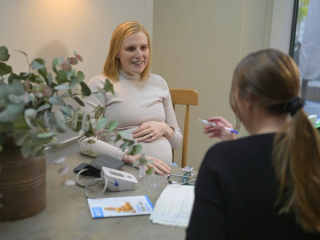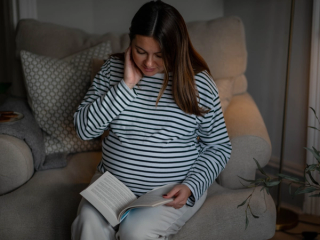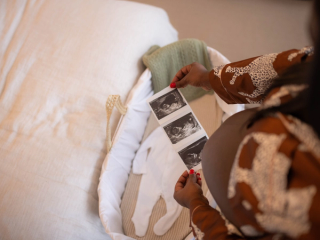
- Home
- Advice Hub
- Pregnancy
- Pregnancy Tips & Support
- Top Questions To Ask A Midwife
Questions to ask your midwife at antenatal appointments
Discover essential questions for your midwife during antenatal visits. Ensure you're prepared and informed throughout your pregnancy journey.
Reviewed by Christine Lane, Midwife and Consultant, on the 24.09.2025
Throughout pregnancy you will be seen by a midwife or doctor numerous times to check on the health and wellbeing of you and your baby. These appointments provide an excellent opportunity to ask questions so be sure to write them down before you attend so that you don’t forget. This article will explore the antenatal appointment schedule and suggests some questions that you may want to ask.
What happens during your antenatal appointments?
Your first midwife appointment, also known as the antenatal appointment, will be scheduled withing the first 10 weeks of your pregnancy. During your pregnancy you will be offered two routine scans, one at around 12 weeks and the second at 20 weeks.
During each appointment, your midwife or doctor will carry out a number of checks depending on your pregnancy stage. This can include checking your blood pressure, urine testing, listening to the baby’s heartbeat, measuring your fundus (size of your uterus from the pubic bone to the top), and blood tests.
There will also be opportunity to discuss any concerns and when you are closer to your due date, your birth plan. Some women may also have an obstetrics appointment. This usually happens if the pregnancy isn’t straightforward, perhaps there are pre-existing conditions such as epilepsy, or there may have been issues with a previous birth. You may be thinking to yourself “ can my partner come to my appointment”, and the answer is yes. Most maternity units have no problem with partners attending antenatal appointments.
Questions to ask midwife or GP during first visit
8 to 12 weeks midwife appointment
Your initial appointment is usually called your booking appointment which will last around an hour.
So, what happens at the first appointment?
You will be asked lots of questions about your health and wellbeing to ascertain the best care for your individual circumstances. It may be worth asking your partner to ensure that they know about any significant family history that may be relevant. You will also be asked for permission to take some blood and this will determine lots of things such as your blood type and starting iron levels.
Here are some other key questions you might want to ask during your first midwife/GP visit:
- Can I have some information on birthplace choices such as home, birth centre and hospital?
- When will I attend all my appointments?
- Who do I contact if I have a concern?
- What should I look out for that might indicate a concern in my pregnancy?
- When will I get my blood results?
- Are there any medications that I should avoid?
- How do I access my pregnancy record?
- Is there anything that can help with nausea?
- How many scans will I be offered?
- Are there any supplements that I should take?
- What screening tests are offered for my baby?
- What changes should I make to my lifestyle?
- Can I still have sex in pregnancy?
Questions to ask midwife at 16, 25, 28 and 31 week visits
In the UK you will only be offered appointments at 25 and 31 weeks if it is your first baby. These visits are routine and will always consist of a urine check so be sure to have a drink before you go. You don’t have to ask the following questions at every visit but you may want to ask a few each time.
- Why do I have an obstetrics appointment (you may want to ask this at 16 weeks if you have received an appointment letter based on the outcome of your initial booking appointment)?
- Will I be offered a tour of the maternity unit?
- When will I start feeling baby movements?
- Are there any classes available regarding feeding my baby?
- How much exercise can I do in the second trimester?
- How many appointments will I have for blood tests?
- What is normal in terms of baby movements?
Questions to ask midwife at 34 weeks
During this appointment, a blood test may be carried out to check iron levels. This doesn’t always happen so do check with your midwife.
- What position is the baby in and is it optimal for birth?
- Can we go through my birth plan?
- What should I do if I go into labour early?
- What services are there available locally after birth to support me postnatally?
- Are there any nutritionally requirements for me at this stage?
- How will I know the difference between Braxton hicks contractions and real labour contractions?
- How long will I need to stay in after giving birth?
- Is there anything in particular that I should bring in to hospital/birth centre?
- Will I meet the midwife that will attend my birth?
- Can my partner stay with me overnight?
Questions to ask midwife at the final appointment
Your final appointment may be anywhere between 40-42 weeks depending on whether or not you go into labour. If you haven’t given birth by 40 weeks, you’ll be seen again the following week.
- What are my options if I go past my due date?
- If I decide not to have an induction of labour, what are the next steps?
- What should the baby movements be like at this stage?
- What are the visiting times at the maternity unit?
- Will I be visited at home by a midwife after the birth?
- Are there any checks that are done on the baby after birth?
- I’ve heard about the ‘red book’ for my baby, when will I receive this?
- How long is labour likely to take?
When to reach out to your midwife
During pregnancy, it's essential to maintain open communication with your midwife, ensuring any concerns or changes are promptly addressed to safeguard both maternal and foetal health. While some discomforts are common during pregnancy, certain symptoms warrant immediate attention. If you experience severe abdominal pain, especially accompanied by bleeding or persistent headaches, contacting your midwife is crucial. These symptoms could indicate conditions such as ectopic pregnancy or preeclampsia, which require swift medical intervention to prevent complications.
Additionally, any noticeable decrease in foetal movement should prompt a call to your maternity unit. While fluctuations in activity are normal, a significant decrease may signify potential issues with the baby's well-being. Likewise, if you develop symptoms such as sudden swelling of the hands, face, or feet, coupled with high blood pressure, it could indicate preeclampsia, a serious condition requiring monitoring and possible intervention.
By reaching out to your midwife promptly when experiencing concerning symptoms, you ensure timely assessment and appropriate management, promoting a safer and healthier pregnancy journey for both you and your baby.
Midwives are there to ensure you and your baby are well throughout pregnancy, and to support you in having a positive birth experience.









